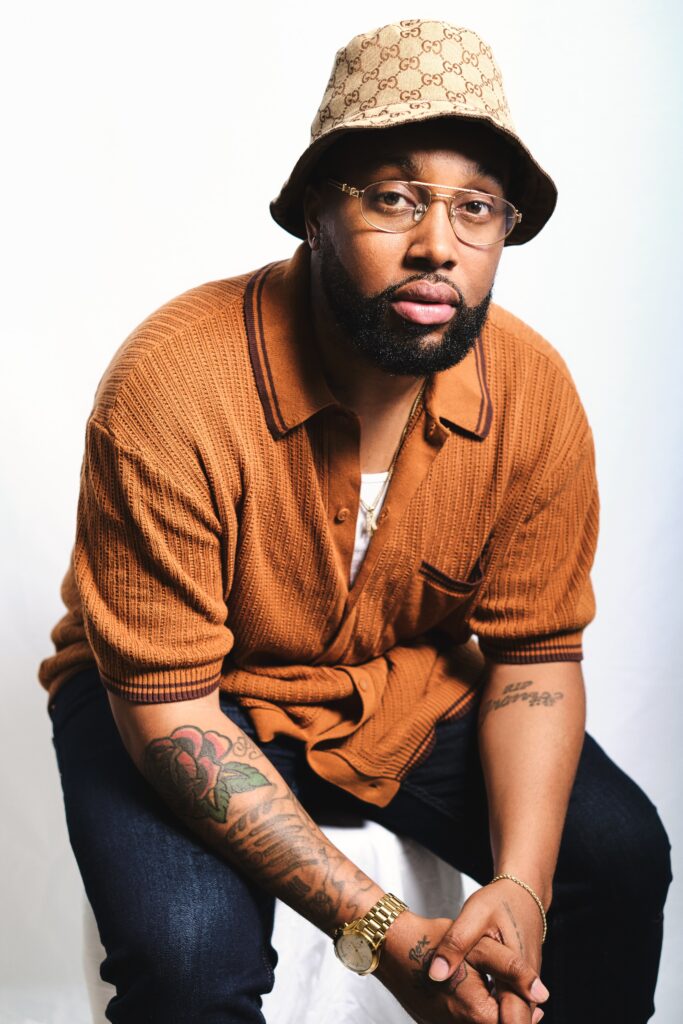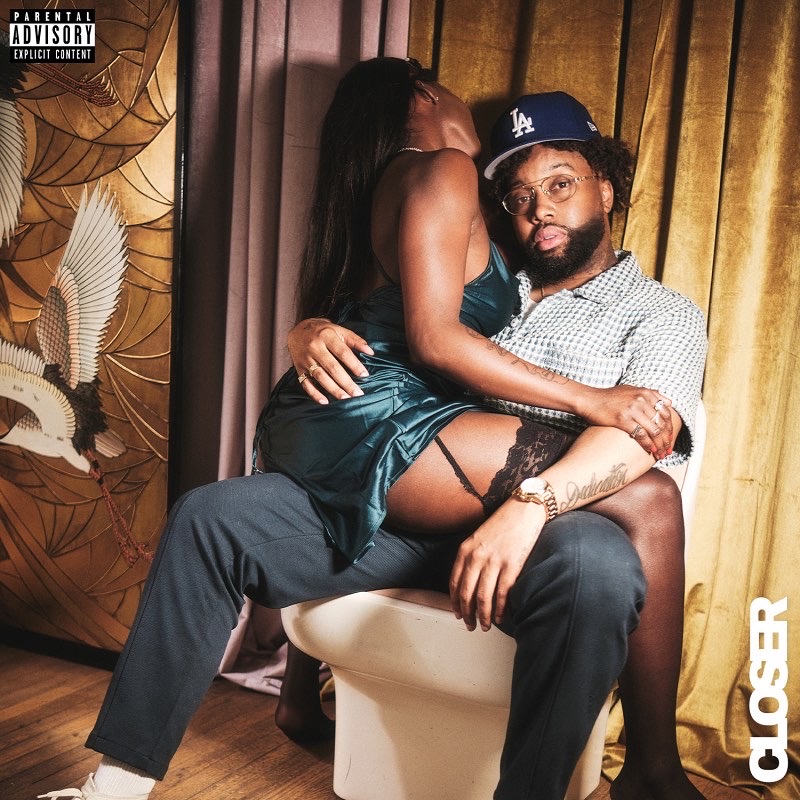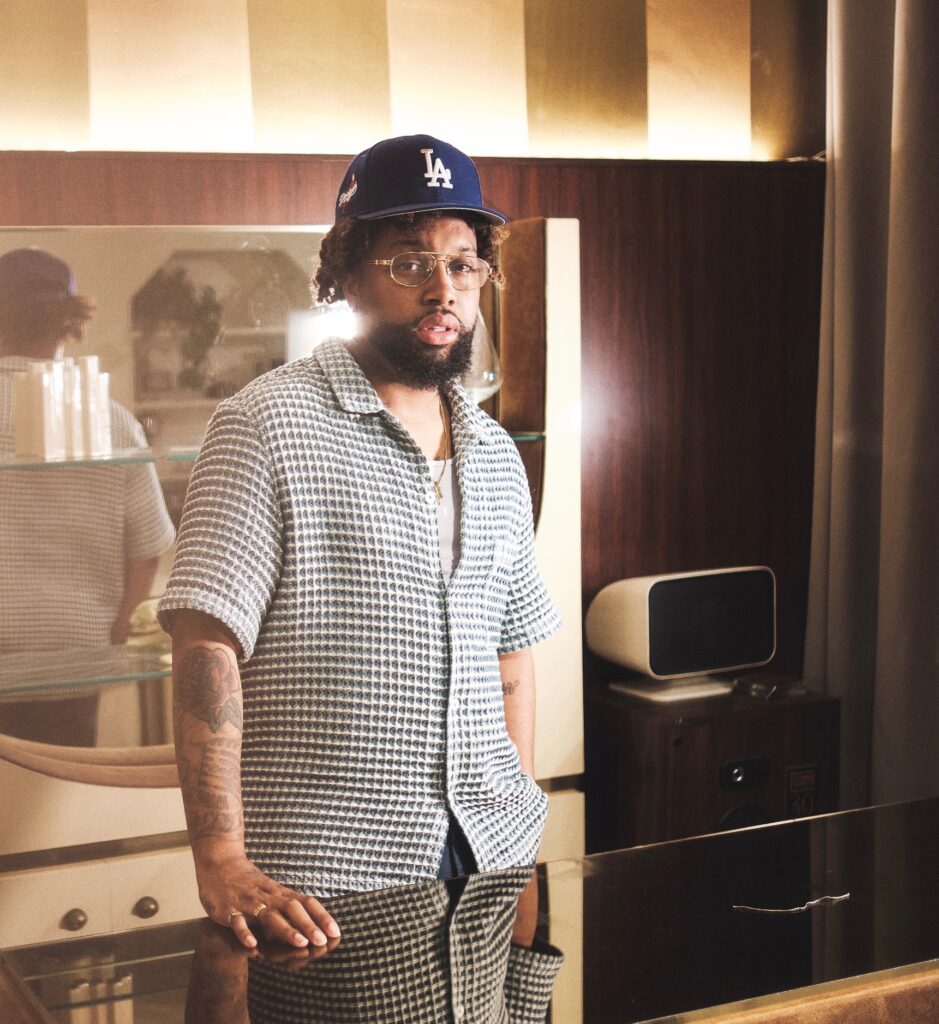Singer-songwriter Kenyon Dixon has quite an impressive musical resumé. For starters, he has a Grammy nomination for “Bring It on Home to Me,” a Sam Cooke tribute, he recorded with PJ Morton, BJ the Chicago Kid and Charlie Bereal. He has written for artists like Mary J. Blige, Justin Timberlake and Tyrese. He has toured as a backing vocalist for Usher, John Legend and Kelly Rowland.
On top of that, Dixon has independently released six albums in the last eight years, including Closer, his new album that is out now. With all that he has achieved so far in his career, there was a time when he avoided music altogether. “I definitely didn’t wanna sing at all,” he tells Rated R&B over a video call.
Dixon was born and raised in South Los Angeles, California. He grew up in the Jordan Downs projects located in the Watts community. His family was heavily involved in the church, and only gospel music was allowed to be played at home. While everyone in his family was musically talented, Dixon preferred to suppress his gift.
“I was trying to do everything else because I come from a singing family and everybody’s musically inclined.” He says his rebellious nature came from having youngest child syndrome — he’s the youngest of seven.
Dixon didn’t stray too far from the arts, though. He was heavily involved with dance and theater.
It wasn’t until Dixon’s senior year in high school that he started to embrace singing, describing it as “the most pivotal moment.” The previous year, he transferred to a new school and started making friends who happened to sing, which made him more comfortable with singing.

“I would do little stuff where they could pick up on that I could sing,” he says with a grin. A friend caught on to Dixon’s vocal ability and recommended him to their math teacher, who also coordinated the school’s talent shows and assemblies. “She started putting me in all of the assemblies, where I was singing and dancing,” recalls Dixon. “That was the switch for me to fully go along with music.”
Dixon eventually began writing and recording music on his “broken Macbook Pro,” gifted to him by a friend, and sharing it on platforms such as SoundCloud and Vine. A positive response from early listeners online inspired him to keep going.
“I think those were the moments that made me realize I wanted to really pursue being an artist,” he states. By 2011, Dixon had released his mixtape titled It Ain’t Easy. “Oh, wow,” he chuckles after I mention the project. “That was my first body of work I ever put out, which is crazy.”
Fast forward to 2022. As mentioned above, Dixon’s new album, Closer, is here. The album, an ode to traditional R&B music, was heavily influenced by his previous album, Expectations, released in 2020.
“The response to Expectations let me know that people were still yearning for classic R&B,” he says. “I wanted to be as intimate as possible in the R&B space, even getting closer to my fans and understanding what they love about [my music].”
Dixon adds, “Closer is about me getting as close as possible to the R&B that we love and breaking down the core elements of R&B. I even asked myself what I love about R&B. I took all of that figured out how to communicate that sonically. It’s a project of intimate records that are really R&B heavy.”
In Rated R&B’s interview with Kenyon Dixon, dives deeper into Closer’s concept, decodes the meaning behind a few songs, talks about advocating for R&B and more.

I read that you grew up in a household where you could only listen to gospel music. When you started making music, what attracted you to R&B?
I think R&B is the rebellious church kid’s genre. A lot of great R&B stems from [musicians] and artists who come from the church. It always seemed to be most relatable. That’s Black music. A lot more music, genre-wise, is Black music as well. But R&B, specifically for Black church kids, that’s what we saw. That was our era of entertainment. I think it is interesting, like you said, considering that I literally couldn’t listen to [R&B]. I would get in trouble if my friends would try to make me tapes with different songs. My mom would find them. What’s most interesting about that whole thing for me now is to watch how supportive she is of my career as an artist.
In your album announcement post, you wrote, “The world needed more R&B.” Do you think there’s not enough R&B music being made right now?
I think there’s not enough R&B being promoted. I always wanted my platform to promote the type of R&B that I do, that I know people love. I try to put my fans onto other R&B singers who I feel are making that kind of music. In saying “the world needs more R&B,” I feel like a lot of artists aren’t as vocal about that disconnect and mislabeling. I always want to make sure it doesn’t get lost in the world’s idea of what R&B is.
As artists, we have a responsibility to be professionals. By that, I mean, in any profession, you’re going to take the opinion or the advice of the expert. It’s so important as an artist to not let the world’s opinion or the world’s idea of what we do shape our actual art, but rather to educate the listeners and let them know, “Hey, this is what this should sound like.”
Anytime I’m talking about the world needing more R&B, it’s my attempt at trying to amplify classic R&B and kill the conversation that nobody’s doing it. I understand the lack of visibility, but I always want to make sure that they know they have an option to listen to something that will actually be here 20 to 30 years from now.
R&B singers should be able to sing. Bare minimum
— KENYON DIXON (@kennygotsoul) April 9, 2022
That’s a fair assessment. It’s a reminder that music is a form of art. Sometimes it’s served (or marketed) to you, and other times you purposely seek it out. The same thing applies to R&B music.
One-hundred percent. In comparison to art, there is specialty art. There’s a certain type of art for certain types of people. I think music can be that as well. It only becomes problematic when we try and group everything into the same category. There’s a time and space for all creation. My preference is to make classic music. I love music. I respect music as an artist and as a musician. It’s always something I want to make sure is connected to my artistry.
You released “Love on Replay” featuring Tiffany Gouché as the first single from Closer. What was your inspiration behind this song?
Man, that’s probably one of my favorite records on the project. Obviously, I brought Tiffany Gouché along, who added something amazing to the record. “Love on Replay” is an ode to classic love. It’s identifying that somebody so different than everyone else around and all of the experiences that you had. To keep our love on replay is something that I want to continue to do because it’s a good feeling. It’s real love, so you want to do what you can to keep it around.
“ISLY (I Still Love You)” is another highlight on the album, where you sing about having unconditional love for your partner. What was your intention when making this song?
“I Still Love You” is a very personal record. I thought about how cool it was in the late ‘90s and early ‘00s for R&B guys to talk about and express love. I feel like now there’s no range of emotion when it comes to R&B music, especially for guys. We don’t really popularize it anymore. On this song, I wanted to be honest with myself about how I felt. It touches on letting her know: “Regardless of everything, I never expected you to be perfect. I have my fair share of issues too, but even on your worst days, I still love you.” It also creates accountability on my end to show that love. It’s easy to say that and not showcase it. “ISLY” is true to the title.
You teamed up with rapper D Smoke for “Get High, Get By,” where you both talk about dealing with the hardships of everyday life. It’s timely and has a timeless message. Why was it important for you to include this song on your album?
I wanted to normalize being an artist. I think that listeners sometimes forget that artists are human. We think the artist’s experience is much different, and they don’t have to deal with the regular troubles of life. I wanted to level that playing ground to let my listeners know: “I understand y’all as well.”
“Get High, Get By” is also like escapism to me, finding ways to deal with the human experience. There’s so much shit happening every day, and it’s like, “What do you do to get away from that type of stuff?” I think the song also supports mental health because if you live in a state of just negativity and bad things at all times, you would be miserable.
On the album, we have “Smoke’s Interlude,” which gives more insight into “Get High, Get By.” We talk about how, historically, we’ve been able to take that trauma and turn it into things that we can connect on mutually and make a celebratory. More than anything, I just wanted to give everybody something to feel good.
What do you do to ‘get high, get by’?
That’s a great question. I love hiking and being outdoors. It opens my mind, especially if I’ve hit [writer’s] block or something. I just started playing tennis, which is so random. I knew nothing about tennis, but there’s a court right here by my house. Also, just writing in different capacities. I don’t just write music. Sometimes, I’ll do my version of journaling.

You end the album with the title track, “Closer.” Whenever I see a title track on an R&B album, as a fan, I expect that the song is among the standouts on the album. I can honestly say that “Closer” is among my favorite songs on the album. What was it about that song that prompted you to name the album after it?
I went through so many different titles for this album. When I did the record “Closer,” there were a few things that I was thinking about. I’m a huge Usher fan, specifically Confessions era, and it made me think about that album — and all the albums inspired by it — about how you knew when you were at the end of an R&B album. There was always that record that felt like, “This is the last one on the album.” I tried to take that feeling and put it into that song.
Interestingly, “Closer” is about a sneaky link (laughs). It’s about this interaction with someone that probably isn’t the healthiest or the most supportive, but every time you guys come together, it’s something magical that you enjoy for that moment.
When I thought about the idea of distance in that song — and talking through coming back together with somebody — it made me think about the album overall. I thought about how disconnected people kept saying they were from R&B. I tried to personify this and say, “OK. What if this person was R&B and then this was me? If we felt like there was some sort of disconnect, how can we come back closer to that?” It made me realize that the album should be called Closer because I felt like it embodied all of the songs. My overall goal with R&B is to end the conversation about the lack of quality in R&B and what’s nonexistent.
How do you want listeners to feel after listening to Closer?
I want people to fall in love with music again, and I mean, really love it. When you love music, the way we did, it came with a certain kind of support that we haven’t seen. I think the lack of support that would be comparable to what we’ve seen is because people don’t feel connected to music anymore. They’re just hearing a bunch of songs. We’re not even getting albums, so it’s impossible for anything to be cohesive.
You can’t follow an artist’s brand or the era without them putting out bodies of work. I’m an album artist. I like the cohesiveness because there’s a part in me, as a music fan, who enjoys the whole experience. You just can’t really get that just from dropping single records. But, I understand it on the artist’s side, because it can be very taxing to put so much into these projects, and you just never know how it’s going to go.
Stream Kenyon Dixon’s new album Closer below.

